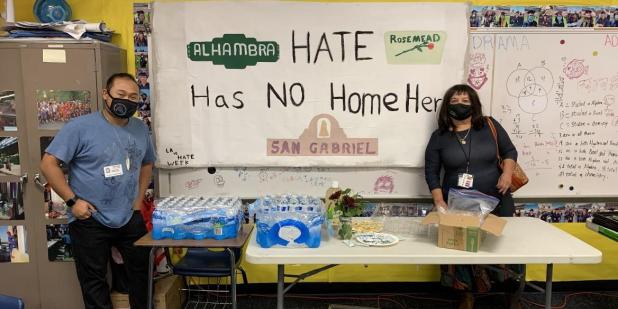Join us for a free one-day workshop for educators at the Japanese American National Museum, hosted by the USC U.S.-China Institute and the National Consortium for Teaching about Asia. This workshop will include a guided tour of the beloved exhibition Common Ground: The Heart of Community, slated to close permanently in January 2025. Following the tour, learn strategies for engaging students in the primary source artifacts, images, and documents found in JANM’s vast collection and discover classroom-ready resources to support teaching and learning about the Japanese American experience.
Anti-Asian Hate Still Rising

Subscribe to our weekly newsletter to get it delivered straight to your inbox!
Hate crimes against Asians and Pacific Islanders in the U.S. have been rising since 2015. A recent survey of Asian Americans and Pacific Islanders (AAPI) in the Los Angeles suburban communities of the San Gabriel Valley found that about a third had experienced or had a family member experience a race-based hate incident since the March 2020 start of the pandemic. Most were the sorts of verbal abuse that doesn’t get reported to police agencies. Nearly half of the respondents said they feel less safe than they did prior to the pandemic.
The overall increase in race-based abuse coincides with increasingly negative attitudes towards China in the wider population and the specific rise since the pandemic coincides with inflammatory rhetoric about a “China virus” or “Chinese virus.” Many see these phenomena as linked. Anxieties about China’s rise, allegations that China’s progress comes at the expense of Americans and the climate of worry generated by an airborne illness that has already taken 900,000 lives in the U.S. have nurtured fear, discrimination and violence.
From 2019 to 2020, hate incidents against AAPI individuals reported to the FBI increased 149% to 122. Most incidents, of course, go unreported. A new study from the Center for the Study of Hate and Extremism at CSU San Bernadino reports that in six major U.S. cities, hate crimes continued rising in 2021. In just New York City, 133 hate crimes were recorded – more than the FBI’s national total for 2019-2020. The Stop AAPI National Report also found that physical violence among these hate crimes increased by 17%. The charts below illustrate these dangerous trends.
Many people and organizations have pushed back against the rise in hate speech and violence. Along with partners, we have held events focusing on this (April, May). reported on some of this a year ago. Abuse and violence have not abated. More work is needed. Recognizing and documenting the harm done, not just to individual victims but to other people who are made to feel unwelcome and vulnerable is an important first step. Prosecuting these crimes and publicizing these prosecutions is essential. Encouraging victims and witnesses to come forward is vital. Educating all about the history of discrimination against AAPI and the ongoing struggles against the fear and prejudices that foster it is hard, time-consuming and necessary. Each of us can and should help. Please visit our resource page to learn about what is being done and how you can aid efforts to breakdown the prejudices and squelch the abuse.
Featured Articles
Please join us for the Grad Mixer! Hosted by USC Annenberg Office of International Affairs, Enjoy food, drink and conversation with fellow students across USC Annenberg. Graduate students from any field are welcome to join, so it is a great opportunity to meet fellow students with IR/foreign policy-related research topics and interests.
RSVP link: https://forms.gle/1zer188RE9dCS6Ho6
Events
Hosted by USC Annenberg Office of International Affairs, enjoy food, drink and conversation with fellow international students.
Join us for an in-person conversation on Thursday, November 7th at 4pm with author David M. Lampton as he discusses his new book, Living U.S.-China Relations: From Cold War to Cold War. The book examines the history of U.S.-China relations across eight U.S. presidential administrations.




